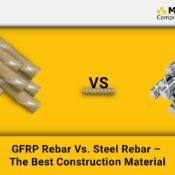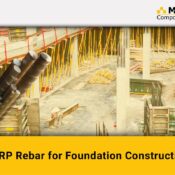Construction forms the backbone of modern infrastructure development. It includes various types of construction such as swimming pools, roads, highways, industrial floors, septic tanks and many more. Understanding different types of construction is crucial and selecting the best construction materials and techniques that ensure structural integrity, durability and cost-effectiveness. GFRP bars are an ideal choice for different types of construction. GFRP bars comes with various positive properties such as High strength, lightweight, durability, cost-effectiveness, etc.
MRG Composites stands at the forefront of revolutionary construction solutions, pioneering the use of advanced Glass Fiber Reinforced Polymer - GFRP bars in India's construction industry. MRG Composites is a leading GFRP Rebar manufactures in India and supplying worldwide. MRG Composites has built a strong reputation with over 17 years of industry expertise, completing 5000+ successful projects worldwide. With more than 5000 metric tons sold, the company stands as a trusted leader in composites. Its dedication to quality and innovation has earned 100% customer satisfaction across all projects.
What is GFRP Rebar?
Glass Fiber Reinforced Polymer - GFRP rebar is a revolutionary advancement in construction reinforcement material. GFRP bars are 2 times stronger, and ¼ lighter than traditional steel bars. GFRP is a non-conductive, cost-effective and durable construction material.
Unlike traditional steel rebars, GFRP bars are corrosion resistant. It does not rust and corrode, It is compatible with water, salt water and chemicals. GFRP is an ideal choice for marine construction, dam, water side wall and bridges on water construction.
Construction Process
The construction process involves several critical phases that determine project success, and GFRP rebar integration enhances each stage:
- Planning and Design Phase: This is the primary step in every construction. In planning Engineers decide project scope, requirements, and objectives. Architects and Engineers make detailed plans and blueprints. Project planning is one of the important phases in construction. You can track construction progress, cost and other factors.
- Site Preparation: Before starting construction, it is necessary that construction needs to be leveled, cleared and prepared. Site preparation includes excavation, grading and layering.
- Foundation: The foundation is crucial as it supports the entire structure. The foundation can be made of concrete, steel, or other materials. It depends on construction types.
- Structural Framing: After foundation creation, we can create structural framing. It involves walls, floors, and roofs using construction materials.
- Installation of Utilities: Plumbing, electrical, and mechanical systems are installed to provide essential utilities like water, electricity, and heating/cooling within the building.
- Quality Assurance: Throughout the construction process, it is necessary to check the quality of construction.
- Handover: This is the last step in the construction process. After completion of the construction project, the building is handed over to the end user.
Applications of Construction and How GFRP Rebar is Useful in different types of Construction
GFRP Bars for Base Slabs and Industrial Floors
Industrial flooring and base slab construction require reinforcement materials that can withstand heavy loads, chemical exposure, and constant wear. GFRP bars complete these requirements by providing superior strength and chemical resistance compared to traditional steel reinforcement.
Industrial facilities exposed with aggressive chemicals, oils, and corrosive substances that rapidly degrade steel reinforcement. GFRP bars maintain their structural integrity in these harsh environments, eliminating the risk of corrosion-related failures
GFRP Rebar is a lightweight construction material. The installation of GFRP Rebar is very easy and it can also handle load bearing of heavy vehicles and machines. It also saves the construction time and labor cost, it also ensures durability of construction and provides high performance in high-stress industrial environments.
GFRP Bars for Roads
Road construction presents unique challenges including heavy traffic loads, weather exposure, and ground movement that traditional reinforcement materials struggle to address effectively. GFRP bars provide ideal solutions for road construction through superior strength, flexibility, and environmental resistance.
Highway and road construction projects benefit from GFRP's ability to handle dynamic loads from heavy vehicles while maintaining structural integrity over extended service periods. The material's resistance to freeze-thaw cycles, salt exposure, and moisture penetration ensures road longevity with reduced maintenance requirements.
GFRP rebar's non-conductive properties prevent electromagnetic interference with communication and navigation systems, making it particularly valuable for modern smart highway applications that integrate electronic monitoring and communication technologies.
GFRP Bars for Foundations
Foundation construction demands reinforcement materials that provide reliable long-term performance under challenging ground conditions. GFRP bars offer exceptional advantages for foundation applications through superior corrosion resistance and structural performance.
Ground moisture, soil chemicals, and environmental factors that typically compromise steel reinforcement have no effect on GFRP bars, ensuring foundation integrity throughout the structure's service life. This resistance eliminates the risk of foundation failure due to reinforcement corrosion, a common cause of structural problems in traditional construction.
The high strength-to-weight ratio of GFRP allows engineers to optimize foundation designs, potentially reducing concrete requirements and overall construction costs while maintaining or improving structural performance standards.
GFRP Bars for Swimming Pools
Swimming pool construction requires reinforcement materials that can withstand constant water exposure, chemical treatments, and structural loads. GFRP bars provide ideal solutions for pool construction through complete water resistance and chemical compatibility.
Traditional steel reinforcement in swimming pools faces constant exposure to chlorinated water and pool chemicals that cause rapid corrosion and structural deterioration. GFRP bars eliminate these concerns by providing complete resistance to water penetration and chemical attack, ensuring pool structure integrity for decades.
The smooth surface characteristics of GFRP bars also reduce the risk of concrete cracking and water leakage that commonly occurs with corroded steel reinforcement, maintaining pool aesthetics and functionality over extended periods.
GFRP Bars for Septic Tanks
Septic tank construction presents extreme challenges for reinforcement materials due to constant exposure to aggressive wastewater, chemicals, and anaerobic conditions. GFRP bars excel in these harsh environments by providing complete resistance to biological and chemical degradation.
The wastewater environment in septic systems contains acids, bases, and organic compounds that rapidly corrode steel reinforcement, leading to structural failure and environmental contamination. GFRP bars maintain their structural properties indefinitely in these conditions, ensuring septic system reliability and environmental protection.
GFRP's resistance to biological degradation also prevents the growth of bacteria and microorganisms that can compromise reinforcement integrity in septic applications, providing superior long-term performance compared to traditional materials.
GFRP Bars for Underground Water Tanks
Underground water storage systems require reinforcement materials that can withstand hydrostatic pressure, soil conditions, and constant water exposure while maintaining water quality standards. GFRP bars provide optimal solutions for these critical infrastructure components.
The non-metallic composition of GFRP bars eliminates the risk of water contamination from corrosion products that commonly occur with steel reinforcement in water storage applications. This characteristic ensures water quality compliance and system longevity.
GFRP's superior tensile strength enables engineers to design more efficient underground tank structures with thinner walls and reduced material requirements while maintaining structural performance standards for hydrostatic pressure resistance.
GFRP Bars for Precast Concrete
Precast concrete manufacturing requires reinforcement materials that provide consistent performance, dimensional stability, and superior strength characteristics. GFRP bars offer significant advantages for precast applications through predictable properties and enhanced durability.
The manufacturing environment for precast concrete often involves accelerated curing processes, chemical treatments, and handling stresses that can compromise traditional reinforcement materials. GFRP bars maintain their properties throughout these processes, ensuring consistent precast element performance.
GFRP's lightweight characteristics also reduce the overall weight of precast elements, simplifying transportation, handling, and installation processes while maintaining structural performance requirements.
GFRP Bars for Bridges
Bridge construction represents one of the most demanding applications for reinforcement materials, requiring exceptional strength, durability, and resistance to environmental factors. GFRP bars provide superior solutions for bridge construction through enhanced performance characteristics and longevity.
Bridge structures face constant exposure to weather, traffic loads, and environmental factors that cause rapid deterioration of traditional steel reinforcement. GFRP bars eliminate corrosion concerns while providing superior strength and fatigue resistance for extended bridge service life.
The electromagnetic neutrality of GFRP bars also prevents interference with electronic systems commonly used in modern bridge monitoring and traffic management applications, making it ideal for smart infrastructure development.
Conclusion
GFRP rebar represents the future of construction reinforcement, offering superior performance across all types of construction projects. From residential foundations to complex bridge structures, GFRP bars provide enhanced strength, durability, and cost-effectiveness compared to traditional steel reinforcement.
MRG Composites' commitment to quality and innovation has positioned the company as India's leading supplier of GFRP solutions, supporting the construction industry's evolution toward more sustainable and efficient building practices. The comprehensive range of applications demonstrates GFRP's versatility and superior performance across diverse construction types.
As the construction industry continues to demand higher performance standards and longer service life from infrastructure investments, GFRP rebar emerges as the ideal choice for modern construction projects. The material's unique combination of strength, durability, and environmental resistance makes it indispensable for creating resilient infrastructure that serves communities for generations.
Choosing GFRP rebar for construction projects represents an investment in long-term performance, reduced maintenance costs, and superior structural reliability across all types of construction applications.
FAQs
- What is GFRP bars?
Glass Fiber Reinforced Polymer - GFRP bars are revolutionary advancement in construction reinforcement material. GFRP bars are composite materials made from high-strength glass fibers embedded in a polymer resin matrix. These bars serve as an alternative to traditional steel reinforcement in concrete structures, offering superior performance characteristics for modern construction needs.
- What are the main types of construction?
Construction encompasses various specialized types that form the backbone of modern infrastructure development:
Swimming pools - Recreational and commercial aquatic facilities
Roads and highways - Transportation infrastructure and traffic networks
Industrial floors and base slabs - Manufacturing facility foundations
Septic tanks - Wastewater treatment systems
Underground water tanks - Water storage infrastructure
Foundations - Structural support systems for buildings
Bridges - Transportation connectivity structures
Precast concrete structures - Prefabricated building elements
Marine construction - Water-related infrastructure projects
Each type requires specific materials, techniques, and considerations for optimal performance and durability. - How GFRP bars are an ideal choice for different types of construction?
GFRP bars come with various different properties such as High strength, lightweight, corrosion resistant, non-conductive, durability and cost-effectiveness. GFRP Rebar is 2 times stronger and ¼ lighter than traditional steel rebar. It provides more strength at lighter weight and it completes construction needs.
All Categories
Recent Posts
GFRP Rebar vs. Steel Rebar: Strength, Durability & Benefits
GFRP Rebar for Foundation Construction
MON-SAT 8:00-9:00
+91 69 863 6420




